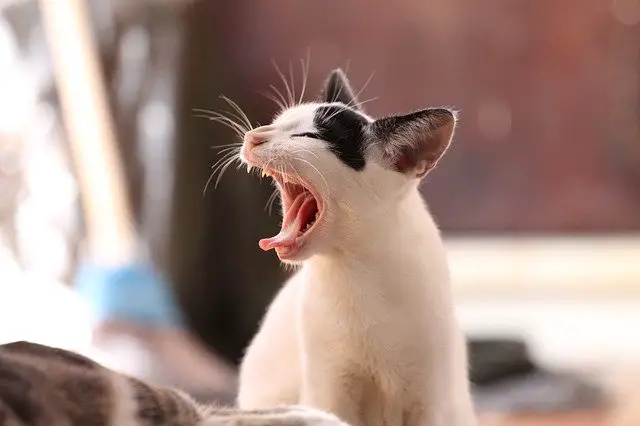Remember when you were a teenager and you’d grunt and make non-committal noises in response to your parent’s questions? Whether they realized it or not, these sounds meant something, right? Even though it was most likely just “leave me alone”. Well, your little kitty’s meows mean something too!
You might have a really chatty cat. In this case, you will become pretty familiar with the meaning behind their noises quite quickly (trust us!). However, if your feline friend isn’t so talkative, it might be somewhat startling when he or she does try to speak to you. And no, we’re not trying to anthropomorphize anything here, they are literally attempting to talk to you.
Even though they don’t have very expressive faces like dogs, their behavior, meows, body language, and daily routines can tell you everything you need to know. Honestly, once you’ve read this you’ll be surprised at how simple it is to decode your little fur ball’s noises.
What Does My Cat Meow Mean?
Meowing is a language that cats have inherited to communicate specifically to humans. They never meow at each other — unless they are kittens and communicating with their mum.
Kittens use their little noises to grab their mother’s attention. While this stops when they’ve grown, the meowing at you is really no different. Your little fuzzy friend needs you. They rely heavily on you. He/She knows that you, a human, can’t pick up on any scent or body language so they meow to communicate with you.
The specific meanings for each type of meow are so diverse (we will talk about them in a second). However, you will soon get to know what your cat’s meows, growls, and purrs mean the more you listen.
What Do Their Different Meow Sounds Mean?
Felines have a bunch of meow sounds, all of which vary in volume, length, and pitch. So, yes, for a first-time cat owner, it’s quite complicated. But, you should put some effort into getting to know what they all mean, so you can take the best possible care of them.
Generally speaking, unlikeable sounds are reserved for when your little one is annoyed or is demanding something. Likable meows are for when they are wanting attention or, more likely, food.
Although you can leave it there if you like, we strongly suggest you carry on to learn more about each meow. Otherwise, it will take you a lot longer to learn your cat’s rhythm.
Let’s get into the details, shall we?
Short Meow Or Quick Meow
Unfortunately, we can’t go around with a microphone waiting for our cats to make each of these sounds, so we’ll do our best to describe them accurately!
This is their standard little mew. Basically, it means “hi!” or “hello!”.
Multiple Meows or Numerous Mews
They are super excited to see you and this should warm your heart! Your fuzzy little friend will usually do this if you have been at work all day or you have been away on holiday and they haven’t seen you in ages.
Mid-Pitch Meow
Generally, this is a “please can I have some food”. However, it might be that they just want some cuddles and fuss. You will have to decide which one it is at the time!
Long, Drawn-Out Meow
This one kind of sounds like this, mrrooooow. It is a demand. Either they are insanely hungry or they want you to let them out NOW.
[su_box title=”If you are in a hurry”]I have outlined most of the meanings our cat meows mean but there is a lot missing and the article would be far too long for you to read. That is why I want you to Click Here to have a free look at an in-depth course that will teach you what your cat is really trying to tell you and ultimately improve the relationship you have with your cat.[/su_box]
Low-Pitch Meow
It sounds like this, mmrroooowwww. This is a complaint. Yep, cats are known for their somewhat aloof and uncaring attitude. A low pitch meow is them telling you that you have done something that they do not like. It could be about anything, but it is often related to the fact that their food bowl isn’t full. Our advice? Fill it!
High-Pitch Meow
This should hurt your heart. It means your gorgeous little feline pal is in pain or very angry. If you have ever missed a step and accidentally trod on your poor cat’s tail, they will let out a high pitch wail. You need to apologize!
The next time you hear any of these, you will know exactly what to do! But, we are not quite finished yet. Cats make plenty of other sounds that you need to interpret. So, let’s get on to these so you can become a self-appointed cat whisperer.
Purr
Everyone loves a cat’s purr. It’s hypnotic and thoroughly enjoyable. It is typically very deep and throaty, yet soft and warming. If your cat is purring, he or she is likely to be in the best possible mood. This sound of contentment is definitely going to come out when your feline friend is nestled in your lap and you are stroking their head.
Having said that, purring can be a sign of agitation or nervousness. Although this is rare, it has been known to happen. Think about your nervous habits. You might hum or bite your nails, it is essentially your cat’s version of that!
How can you figure out which purr it is? Good question! It’s rather simple.
Look at their body language. If their body is tense and their ears are back or flattened, then they are concerned about something.
Trills, Chirps, and Chirrups
Your feline sidekick learned this when they were a kitten! These sounds are more akin to a bird than a furry little cutie. While mum cats use them to tell their kittens to pay attention or follow, adult cats utilize these noises to ask you to look at them or figure out something.
Typically, when your little kitty makes these trills, they are excited and happy. Like a child bouncing around or giggling.
Chatter
When the door is closed and the outside world seems far away to your cat, they might gaze out of the window at a rampant squirrel and chatter their teeth. It might even be followed up with a little squeak, trill, or chirp.
This is generally indicative of predatory excitement and the stress that comes along with the fact that they can’t get to their prey. Sometimes, they will almost silently chatter to ensure their body stays still while they crouch, waiting to pounce. It’s unlike everything you’ve ever seen before. The first time we saw a cat do this, it was quite something!
Hiss
Yup, your cat’s hiss will be unmistakable. It almost sounds like chicken frying, doesn’t it?
Your cat is feeling threatened and is more than ready to start a fight if necessary. If you have both cats and dogs in the house, you have probably heard a hiss more than a few times! But, they don’t just hiss, do they? Nope!
The terrifying sound brings about a shift in their body language. Their back goes up, their tail twitches menacingly, their fangs come out, and their ears flatten right down to their skull. It is quite a scary sight — especially if they spit as well! You need to leave them be and try your best to stop whatever they consider the threat to be.
Some cats hiss more than others. If you have a friendly, extroverted kitty, they might never hiss. However, if your little one is shy or reserved, they will probably hiss whenever they are concerned about a situation. It’s extremely common for abused or feral cats to resort to this sound instead of anything else.
Yowl
Typically, this one doesn’t directly concern humans. It tends to be a more cat-to-cat mating concern or territorial issue type of communication.
However, if your cat is poorly or you have a new cat in the house, they might yowl to show you their discomfort. Sometimes though, they will just yowl because they’re bored, which can be fairly disconcerting for new cat owners!
If your kitty starts yowling a lot — alike, they don’t stop — it could be the first signs of illness. We suggest that you take them to the vet right away.
Snarls or Growls
As you might have imagined or heard before, snarls and growls tend to come along with hisses. They signify fear, territorial issues, and anger most of the time.
With domestic kitties, it is usually rather high pitched. Whereas wildcats adopt a much lower, scarier growl.
You need to leave your number one pal alone at this point. There isn’t much you can do. Of course, they will probably bat you with a paw or be ready and waiting to strike so it’s obvious they want to be void of contact!
Caterwaul
You won’t hear any cat accept females in heat making this plaintive, shortened yowl. It is essentially a mating call where the female kitty will do everything within her arsenal to secure a mate. Yup, this is where the male cats fight for her. How romantic (although it’s really anything but that!).
The Bottom Line
You’re basically a cat meow expert now! You’ll never be caught out again.
[su_box title=”Affiliate Disclosure”]This website is supported by its readers. Please assume that all links are affiliate links. If you make a purchase from one of the links we will make a commission from Amazon. Thank you.[/su_box]





